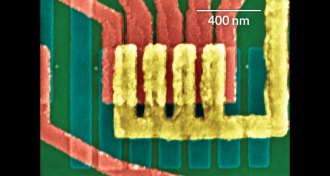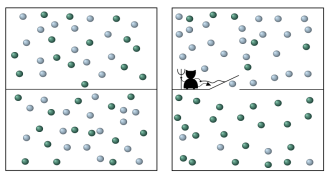Uncategorized
-
 Physics
PhysicsMajorana fermion detected in a quantum layer cake
Scientists found evidence of a particle that is its own antiparticle.
-
 Health & Medicine
Health & MedicineCows produce powerful HIV antibodies
For the first time in any animal, researchers elicit broadly neutralizing antibodies against HIV. Cows’ antibodies could help with drug development.
-
 Genetics
GeneticsThese genes may be why dogs are so friendly
Dog domestication may be the result of just a few genetic changes, including ones that made canines more interested in interacting with people.
-
 Archaeology
ArchaeologyHumans first settled in Australia as early as 65,000 years ago
Australia may have said “G’day” to humankind thousands of years earlier than previously believed.
-
 Tech
TechThe incredible shrinking transistor just got smaller
Tiniest transistor, made with carbon nanotubes, suggests computers aren’t done shrinking down.
-
 Health & Medicine
Health & MedicineCommon drugs help reverse signs of fetal alcohol syndrome in rats
A thyroid hormone and a blood sugar drug affect levels of a hormone needed for brain development, study in rats shows.
-
 Genetics
GeneticsDog domestication happened just once, ancient DNA study suggests
DNA of ancient canines counters idea that dogs were domesticated twice, in Europe and Asia.
-
 Physics
PhysicsScientists peek inside the mind of Maxwell’s demon
Scientists probe information retained by Maxwell’s demon.
-
 Planetary Science
Planetary ScienceGiant mud balls roamed the early solar system
The first asteroids may have been great balls of mud, which would solve some puzzling features of meteorites.
-
 Agriculture
AgricultureGM moth trial gets a green light from USDA
GM diamondback moths will take wing in a New York field trial.
-
 Animals
AnimalsWater bears will survive the end of the world as we know it
Water bears have a till-death-do-us-part pact with the sun, study suggests.
-
 Archaeology
ArchaeologyCopper in Ötzi the Iceman’s ax came from surprisingly far away
Copper for the ancient Iceman’s blade traveled about 500 kilometers to his northern Italian home region.
By Bruce Bower